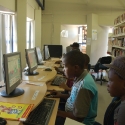 Open source solutions at schools and within the administration are a mine field since the Namibian Government shut down SchoolNet a few years ago. Their legacy can still be found at many schools where surprisingly some of the OpenLab installations (Linux Terminal Server running on common Desktop PCs + old machines with 64 or 128MB RAM and a PXE NIC) are still in use. Anyway, this will be another post soon.
Open source solutions at schools and within the administration are a mine field since the Namibian Government shut down SchoolNet a few years ago. Their legacy can still be found at many schools where surprisingly some of the OpenLab installations (Linux Terminal Server running on common Desktop PCs + old machines with 64 or 128MB RAM and a PXE NIC) are still in use. Anyway, this will be another post soon.
Although a keen supporter of Open source I am often skeptical when it comes to using it in Namibia. The reason is simply the lack of technical skills. You can barely find someone in the North who is able to handle basic administration tasks on a Windows Server 2003 operating system. Although not always the case Open source infrastructure solutions usually need a deeper knowledge of what you’re dealing with. Such knowledge is not around at all.
Why are both of our community libraries now running Edubuntu? Because it is the only feasible option for now. The two sites would actually not be our responsibility. Due to the fact that the centralized support approach is not working once more and libraries had been down most of time we’ve put them on our list as well. The initial installation consist of common Windows XP machines and a Windows 2003 Server. With poor group policy restrictions, only Microsoft Forefront as anti virus running and the nature of a library in mind (people, thus USB sticks coming and going) it is no surprise that such an installation breaks down within hours.
Our hybrid-solution: the ‘fat clients’ running Edubuntu 11.04, the server still Windows 2003. Users only work on the server via rdesktop if they need access to Microsoft Office applications for ‘professional’ training. For all other things (Internet, playing around etc.) applications which comes with Edubuntu are used.
Besides the stability of the Linux system (no viruses, users can virtually not break down the system) it has another benefit: easier deployment. As mentioned earlier. It is not always more difficult to use an Open Source alternative. All Ubuntu derivatives nowadays are easier to set up than any Windows OS as drivers and applications comes with the distribution DVD. As we are working with images this was not a real criteria. The knockout criteria on our side was simply the issue of licensing: we’re still struggling with an efficient way to access the Microsoft licenses (let alone the ones for a proper anti virus solution) at the head office.
Although the users are quite happy with Edubuntu it is clear that in the long run the Namibian libraries need a standardized keep-it-simply-stupid solution. Up to now every region does more or less its own thing. Some regions are lucky as they have a technical skilled person at sites or even a dedicated Peace Corps volunteer. But most of them are not.
The list of features needed for a library environment are long: user & print management, web filtering and an unattended re-installation process of the client computers. But before going fancy the fundamental issues (lack of technical personnel, training, working support models etc.) needs to be solved. I’ll guess we had that topic before.